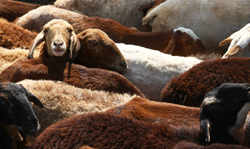Interleukin and interferon assay for sheep
Under the auspices of the MVAC project, scientists at the Centre National de la Recherche Scientifique in Marseilles have completed research that can be applied to vaccination studies generally. However, the team focused specifically on the maedi-visna virus (MVV) which has so far presented obstacles to its control due to the lack of data regarding immune responses. Within a few weeks of infection or vaccination of an animal with MVV, provirus DNA can be found in peripheral mononuclear cells. Interferon-gamma (IFNg) and interleukin-4 (IL4) are produced as biochemical responses by T cells. The scientists developed real-time polymerase chain reaction (PCR) tests to detect these biochemical changes within the immune system. The primers, namely the start points for replication of genetic information used in the amplification process were obtained from previously published gene sequences. The PCR assay can be used for IFNg and IL4 messenger RNA (mRNA) produced from T cells as a response to antigens specific for strain EV1 of the virus. Maedi-visna virus is an economically important viral disease of sheep. It infects its host for life and is insidious in that most infections are sub-clinical. Most worrying for farmers perhaps is that its presence in a flock can mean marketing and export restrictions. A sensitive rapid assay for the infection or vaccination status of animals would be a valuable tool for livestock farmers, not only for lentiviruses but for other bovine and ovine diseases. Further research on the speed and throughput of the assay developed was suggested to increase its value in animal husbandry.







